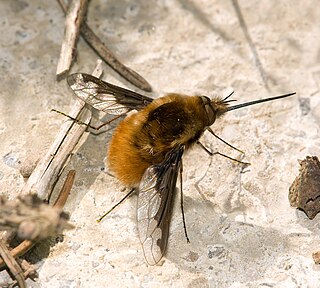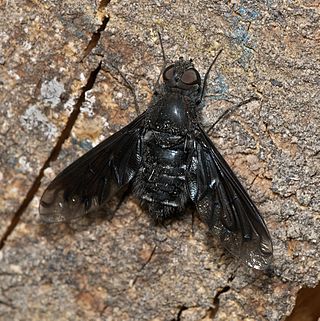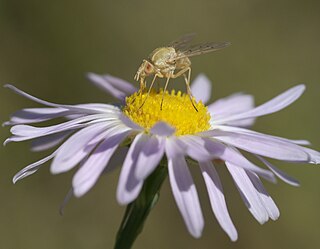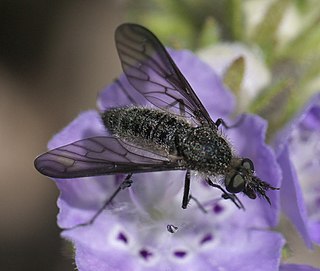
The Bombyliidae are a family of flies, commonly known as bee flies. Some are colloquially known as bomber flies. Adults generally feed on nectar and pollen, some being important pollinators. Larvae are mostly parasitoids of other insects.

Anthrax is a genus of bombyliid flies, commonly known as "bee-flies" due to their resemblance to bees. Most are dull black flies, and are usually small to medium in size, 4–20 millimetres (0.2–0.8 in), and many species have striking wing patterns.

The Asiloidea comprise a very large superfamily insects in the order Diptera, the true flies. It has a cosmopolitan distribution, occurring worldwide. It includes the family Bombyliidae, the bee flies, which are parasitoids, and the Asilidae, the robber flies, which are predators of other insects.
Poecilognathus relativitae, originally known as Phthiria relativitae, is a species of fly of the family Bombyliidae, subfamily Phthiriinae, that is found in California. It was discovered by Neal Evenhuis, who named it as a pun on the "theory of relativity".

Bombylius major is a parasitic bee mimic fly. B. major is the most common type of fly within the Bombylius genus. The fly derives its name from its close resemblance to bumblebees and is often mistaken for them.

Dipalta is a North American genus of bee flies in the family Bombyliidae. There are two described species of Dipalta. The genus is closely related to Villa.

Exoprosopa is a large cosmopolitan genus of flies belonging to the family Bombyliidae (bee-flies), with over 325 described species. The genus parasitizes a wide range of insects, including locust and larvae of wasps.

Apystomyiidae is a small family of flies containing the living genus Apystomyia and the extinct genera Apystomimus and Hilarimorphites. The single living Apystomyiidae species, Apystomyia elinguis, is native to California. Species of Hilarimorphites have been described from Mid to late Cretaceous Burmese and New Jersey ambers, while the single Apystomimus species is from the Late Jurassic of Kazakhstan.
Paravilla is a genus of bee flies in the family Bombyliidae. There are at least 50 described species in Paravilla. The genus is found in North and South America.

Exoprosopini is a tribe of bee flies in the family Bombyliidae. There are more than 20 genera and 760 described species in Exoprosopini.

Systropus is a genus of bee flies in the family Bombyliidae. There are over 200 described species in the genus Systropus, found on every continent except Antarctica.

Thyridanthrax is a genus of bee flies in the family Bombyliidae. There are about 50 described species in the genus Thyridanthrax, found across Eurasia, Africa, North America, and South America.

Poecilognathus is a North and South American genus of bee flies in the family Bombyliidae. There are about 13 described species in Poecilognathus.

Thevenetimyia is a genus of bee flies in the family Bombyliidae. There are more than 40 described species in Thevenetimyia found worldwide, mostly in North America with several species in Australia and southeast Asia.

Systoechus is a genus of bee flies in the family Bombyliidae. There are more than 120 described species in Systoechus.

Aldrichia is a North American genus of bee flies in the family Bombyliidae. The genus contains two described species.

Geminaria is a genus of bee flies.

Geron is a genus of bee flies in the family Bombyliidae. There are at least 180 described species in the genus Geron, found on every continent except Antarctica.

Phthiria vagans is a species of 'bee flies' belonging to the family Bombyliidae.

Phthiriini is a tribe of bee flies in the family Bombyliidae. There are about 6 genera and more than 90 described species in Phthiriini, found worldwide.

















